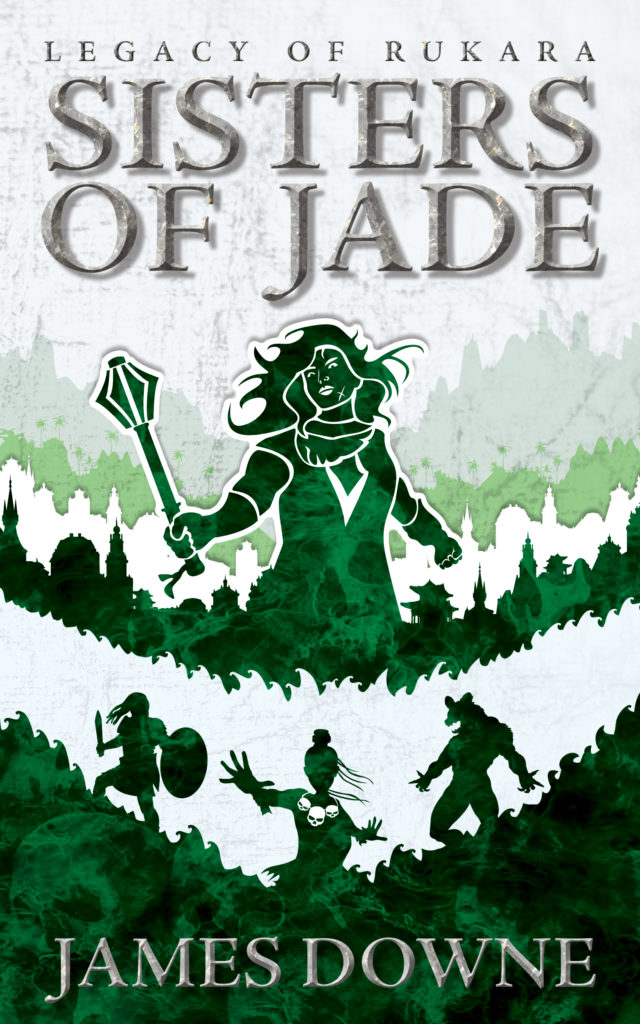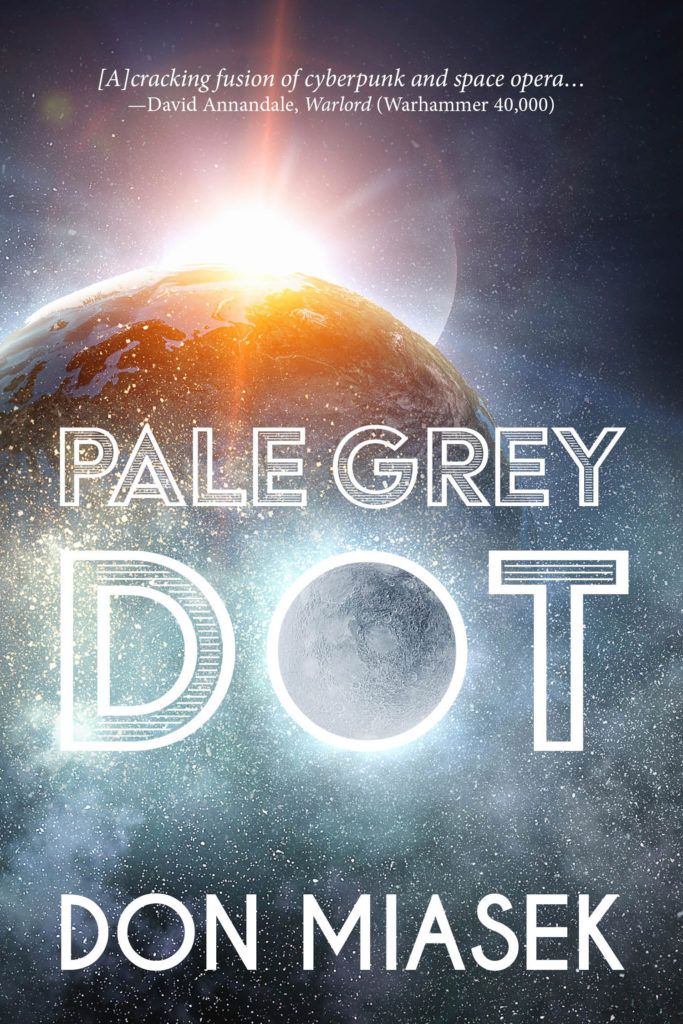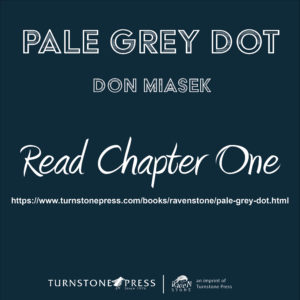
Today we have James Downe, author of the hit series The Legacy of Rukara. In addition to the accompanying short story compilation, Salt & Cinders, the trilogy consists of:
– Sisters of Jade
– Sorrow & Shroud
– The Gorgon Court (coming soon)
James can be found at:
- Website: legacyofrukara.wordpress.com
- Amazon: www.amazon.com/author/jamesdowne
- Facebook: www.facebook.com/legacyofrukara
- Twitter: @jameswdowne
Don: Could you tell us a little about yourself and how you got into writing?
James: It’s kinda typical, I suppose. I read Lord of the Rings when I was 12 or 13. Narnia before that. I found Susan Cooper and Ursula K. Le Guin. After that it was a torrent of fantasy and sci-fi and whatever I could get my hands on, which quickly led to me trying to write my own stories.
Video games are also hugely inspirational for me (shout out to Final Fantasy, Dragon Warrior, Faxanadu, and later Chrono Trigger). I get addicted to games. This only got worse once I was introduced to Dungeons & Dragons in high school. Fantasy and gaming together? Boom! What more did I need? Realizing I could create stories that my friends could experience was it for me. Even if they weren’t great stories, my friends and I had fun.
In my mid-teens I tried to write a book that was very much LOTR/Shannara inspired (oh, Past James, you really tried…), but I never finished. I am so happy nothing remains of that story.
Life kept going. I kept trying. Writing. And I kept reading.
How did you first decide to write a series on the world of Rukara?
The Legacy of Rukara started as a tabletop, pen & paper game setting for me and my good friend Æsc.
I was living in Kingston when I met Æsc and we started playing D&D (Planescape, if anyone is interested) and then Pathfinder. It went well. The way we played worked well together. Our styles fit, as well as what we wanted out of stories in general, and soon we started world-building for a new and unique setting.
Æsc and I gamed in this setting for a few years, tweaking and adapting stuff, before I really started writing stories. We both started writing, especially once I moved to Toronto and the gaming stopped.
I wrote one book in the Rukara setting (more on that later), and then some short stories to figure a few things out. Somewhere along the line I realized the book I had written wasn’t a good introduction to the world. I needed a better way to start, a better hook, as they say.
That was the start of the Sisters of Jade.
Do you consult Æsc for points in the story?
Absolutely! He’s my alpha reader, but the way we’ve divided the world allows each of us to work without needing to consult each other for everything.
That said, Kilaon (the main location in Sorrow & Shroud) was first built around one of Æsc’s characters. We were still gaming at that point, the world relatively undefined, and the necromancy and undead all came about because of his character. A lot of Kilaon came from him.
If I’m being honest, I messed up/altered some of the details, so we’ve recently had to rework some of the history to fit what I changed. But as I said earlier, we work well together, bouncing ideas and problems off each other when we need to.
Specifics for the history and geography of Rukara have changed a lot since those days, but the basic feel and flavour remains the same.
The quartet have been a team for some time before the beginning of the Sisters of Jade. Did you have their past adventures laid out when you began writing or do you make it up as you go?
I wanted a group that was already experienced. Years ago I’d read James Barclay’s Raven Series and wanted to do something similar. We don’t see their beginnings. This isn’t that type of story. They’re sisters, but it’s a found family. They each bring something different to the table, but they all have to face their darker selves pretty much constantly.
For their past adventures, I didn’t have much in mind when I wrote the first draft. It was only after Æsc read it and said I needed to make them feel more experienced that I plotted out some specific events to reference in the story.
I do have some shorts that go into a few past missions, but we’ll see if I ever do anything with them.
In both Sisters of Jade and Sorrow & Shroud, the secondary (villainous?) characters are possibly the most compelling. What was your philosophy behind Baron Mezakis, Senator Hukasa, and General Kovi?
I am so glad to hear you say these characters are compelling! Really, that makes me feel all sorts of wonderful. A good villain is so important. They want. They crave. They struggle. They fight for what they think is right, and while it’s getting better in books written today, it’s still hard to get away from the evil dark lord trope.
My favourite antagonists aren’t the big bad villains. They’re never the final boss. I love Garak on DS9. Ben Linus on Lost. In ASOIAF there’s a reason Ramsay Bolton is such a better character than that stupid Night King bullshit. Ramsay wants. Fails. Struggles. Or in the Wheel of Time, the Dark Lord bores me to absolute tears but the Forsaken are bloody awesome.
I prefer stories that don’t have a typical villain. Two sides with different goals and somewhere along the story these goals conflict. All of this was in my head when I created Mezakis, Hukasa, Kovi, and the antagonists in the next book. (Mezakis was especially important, as his arc is one of attempted redemption.)
Make them feel. Make them people. Make them believable.
For that matter, even the sisters themselves aren’t nice people. They’re in it for themselves, but it’s a matter of how far they’re willing to go compared to those we label as villains.
Given Sisters of Jade gives some, shall we say, special attention to Kylan (and arguably Somhae in Sorrow & Shroud), should we expect a similar focus on specific characters in Book #3, The Gorgon Court?
Another interesting question! You feel Somhae has some special attention in Sorrow & Shroud? I love it. I love how different people take away different things from stories.
Sister of Jade was an intro to the characters, with Kylan at the lead. In Sorrow & Shroud, I wanted to break them apart, shatter them, and give each sister their own path, and in Book 3 I wanted to see if I could reunite them. Make the family whole once more. Will I succeed? Will they succeed? Who knows!
(I’m kidding, of course. I know, but I’m not telling.)
Book 3 does have new characters as well as some returning from Book 1. It’s been fun figuring out how they fit into the dynamic little family, but the focus is definitely on the sisters and how they’ve grown.
Was it a deliberate choice to have Somhae’s abilities fairly well defined? That is to say, causing people and things to disintegrate. Did you have any trouble defining Somhae’s magical abilities?
Deliberate? One. Hundred. Percent. Trouble defining it? Never.
There are priestesses and priests who channel the divine power of their gods, and there are sorcerers who draw arcane power from another source. I touch on this a bit in the short stories in Salt & Cinder.
It’s a combination of the Dungeons & Dragons magic systems, as well as the use of magic and power seen in books like the Malazan Books of the Fallen by Steven Erikson and Ian Cameron Esslemont. Priests are divine. Mages are arcane. Gods give one sort of power, but sorcerers access something else.
For Somhae, her connection to Sinest–the Goddess of Decay–is a very important relationship. As an atheist, the idea of faith has always been interesting to me. I’ve also always enjoyed the presence of gods in stories. Real world mythology is so fascinating, and it’s something I wanted to explore with both Kylan (as a denier of the gods) and Somhae (as a very strong believer in Sinest).
A were-hyena? Really?
Feren! She’s my favourite character to write. Yeah, I know. She’s kinda the Hulk meets Wolverine. Jekyll and Hyde. The Bloody Nine. There was this werewolf character in James Barclay’s Raven series–I forget his name right now–that helped form Feren in my mind.
Struggling with their darker emotions is something the sisters have to face. Feren deals with this constantly. She was born a werehyena, so moonlight isn’t a trigger. I didn’t want to go the werewolf route. There’s too much baggage in the lore.
It’s those moments when rational thought breaks down and people lose control. How do you handle that? How do you deal with that after the moment has passed? Anger often continues because people are embarrassed by the outburst, continuing the cycle. And then what if the moment doesn’t pass, and you are forever a monster?
Quite spends most of Sorrow & Shroud separated from her sisters. Was that a deliberate decision made from the start, or something you decided partway through writing?
It was always my intention to break the sisters apart in book 2. I’ve written them together, but I wanted to see how they would handle being on their own. And then… Quite’s story kept her away.
For the sequel, before I landed on Sorrow & Shroud, I had 3 or 4 previous drafts with the sisters just on another adventure, but it didn’t connect personally with any of them. Giving them all a personal arc, something that mattered to each sister individually, that’s when everything just kinda clicked.
The all-important question: Which of the four sisters is your favorite?
Aaaah! How can I answer that? Somhae seems to be a fan favourite, and I’m thrilled that any of these characters connect with people.
As I said before, Feren is my favourite to write. The beast. The battle against your rage, always trying to keep your darker emotions in check. It’s a battle you never completely win, and I think there are some great stories in there.
The necromantic nation of Kilaon features heavily in Sorrow & Shroud. What approach did you take in creating it? Do you consider the Kilanese (or even the ruling Silstrani) to be evil?
The Sistrani might be evil, yeah. Xaras is definitely greedy and selfish and has no problems killing anyone and raising their corpse to do his bidding. Jul Riah is right there with him. They’re ambitious. So old they’re basically immortal. When you live so long, how much compassion can you retain?
But as I said before, villains should want. The Silstrani are in control of Kilaon, and they want to keep that control. Rastule is fighting against Kilanese culture, rebelling against it, and for all the power the Silstrani have they’re struggling to remain in control.
Is Kilanese society as a whole evil? They’re a culture where wealthy families have slaves. Undead slaves. Undead slaves they’ve made from the poorest class. They call them criminals, kill them, and force them into eternal servitude.
Yeah, that sounds evil, but it’s the system all the people in the country are born into. Our own system of capitalism isn’t much better, just without the fantasy themes thrown on top. What do you do when you’re born into a world that preys on the lowest levels of society in the name of convenience and comfort? Does living in that society make you evil? Or just stuck?
Will the Sisters of Jade ever successfully depart a city without blowing half of it to kingdom come?
Probably not!
How goes Book #3, The Gorgon Court? Is it especially difficult given how fractured the Sisters are at the end of Sorrow & Shroud, or that you have to wrap everything up in just one book?
Progress is going great! The sisters return to the Sovanti Strait one way or another after trying to hide in Kilaon. The first draft is nearly done, but I’ve gotten a bit bogged down with details and need to let them go and just finish the draft.
I’d finished the outline for the whole trilogy before I published book 1, so I’ve known this whole time where everything is going. I don’t like everything tied up in neat little bows, but I want the ending to be satisfying, so knowing the end was very important to me. Too many things I like have horrible nonsense endings…
What does the future hold for the Legacy of Rukara? Is Book 3 truly the end?
As Somhae would say… All things wither, and all things fade.
Ha! While I want a satisfying ending for the trilogy, the world of Rukara is a big place with lots of stories left to tell. What kind of fantasy author would I be if I didn’t have a 12 book series in mind?
I’ve got 3 standalone books I want to work on after, another trilogy lingering in the back of my mind. I’ve also got an earlier book written that I want to go back to. Good luck, Future James!
There is more to the Legacy of Rukara than just the trilogy, of course. How do the stories from Salt & Cinder: Tales from the Legacy of Rukara fit in?
Yeah, so… the Empire of Mirias Deil (where the stories of Salt & Cinder take place) is the setting of the first Legacy of Rukara novel I wrote but never published. That’s the one I wrote but realized it wasn’t a good introduction to the world. Many of the short stories in Salt & Cinder are connected to the plot of that as-of-yet unpublished book.
The kraken. The city of Tyrant. The rebels. The legionaries.
This book is written, but it needs a lot of work. A lot. It was my third real attempt at writing a book (don’t ask about the first two, no one will ever see those…) and I still really like the story, but I’ve grown so much as a writer since then that I couldn’t let anyone else read it without a severe and thorough edit.
If you could go back and change anything about any already-released Legacy of Rukara story, what would it be?
Nothing! They’re all perfect!
Ha… kidding of course. Honestly, I wouldn’t change much. Maybe the shadow assassin character of Greytide in Sisters of Jade. There’s a lot to them that didn’t get into the book. I toyed with seeing their POV, but it just didn’t fit. If I could, I’d add a whole lot more about them.
Other than that, when I first started I released a novella that I really regret. Not the story (though the writing definitely needs a lot of work) but the publishing process. I made some mistakes with self-publishing that I can’t take back. While it mostly fits with what the world became, I can’t consider it canon.
There are about 100 copies of it out in the world, but I’ve pulled it off Amazon since. Maybe someday I’ll rewrite and re-release it, but that’s something for Future James to worry about.
Well, Greytide is still out there. Should we expect more about them in The Gorgon Court?
They’ve got their own journey ahead of them. Early on, I had a few drafts where they showed up in the 2nd book, and then again in the 3rd but it just didn’t fit. It’s interesting how characters take on a life of their own. You hear people say but, but how can that be? I’m the author, right? I should be able to have the characters do whatever I want… but if it just doesn’t work, if the character refuses to do the thing, those events fall flat. If I ever tell it, Greytide’s tale takes them on a much different path.
How did you create the map outlining the world of Rukara? Was it before, after, or during the writing process?
Ah, the maps! I love maps. They’re one of my favourite things about fantasy books. I’ve always made maps, even as a little kid I would try to recreate maps from my favourite books.
The map for Rukara is quite possibly the thing that has changed the most since Æsc and I gamed in this world. I think at first it was one continent, with sessions he ran in the north and mine in the south, but as time went on we fully divided it into several continents and a world was born.
As gaming became writing, the map evolved to give each of us room to breathe and play on our own.
So… third person omniscient, eh? Has that bit of bravery/foolishness caught you any flack?
It’s what I like to read, so it’s what I try to write. First person has to be either really good or really short to keep me interested.
I do try to keep each scene in the POV of one of the Sisters or villains. If I switch POV, I’ll do so because of narrative purposes with a scene break. There are times when I realize I’ve written an action scene with some head hopping and have to break it up.
How do you find the writing scene in Toronto?
Toronto is a great place for meeting with other writers, though I had been here several years before really making any connections.
I’m part of the Toronto Science Fiction and Fantasy Writers group and it is absolutely wonderful. I’ve never found an artistic community that is so open and welcoming. I don’t know if my stories would exist without the support of that group.
I’ve met some other great authors in the city and it’s always a joy. Having a group of people that supports you is great, but having people that also understand what you’re writing and trying to accomplish really is the icing on the cake.
Any suggestions for up-and-coming authors, either in terms of writing or promoting one’s work?
How do I give an answer that doesn’t sound cheesy and overly cliché? Find your voice? FInd people that get it? Write as often as you can and read even more?
There. Done. Cliché.
For reals though, here are three things I’ve learned in my various artistic endeavours.
The first is this: fail faster. Get those mistakes made and out of the way. We learn more from mistakes, so make mistakes early and figure out your process both for writing and publishing.
The second? Finish the draft. Get the whole first draft done before you really start editing. I know this isn’t true for everyone, but I think it’s inevitable that once your done the draft there are going to be a tonne of things you want to change, so just get to that point however you can.
And the third thing?
I had an art teacher a long time ago. Stu. Stu taught printmaking, and he was great. This one time, I made something I really liked. Like, really liked. I thought I’d nailed it. And Stu agreed. It was a great piece. He looked at my work and nodded and talked me up to other people and it was wonderful. But you know what he said to me?
Do it again.
That floored me. Do it again? But… I just did it. Let me revel in my victory, in my achievement. As I’ve gotten older, I get it. I think. Can I explain it? Probably not.
So finish your first draft. Make some mistakes and get them out of the way. Refine your work. Make it the best you possibly can. Revel in your victory, celebrate your achievement… and then do it again.
Thanks for taking the time to share with us, James!




